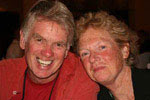Writing the blog of a few days ago, the “Reply to Laurie,” had a pretty profound impact on Brooke—especially the part about the breath. It gave Brooke new insight into the strangeness of aliveness and how close he came to the border. He’s thinking right now about Gilgamesh, the ancient Sumerian text, and the journey Gilgamesh undertakes after the death of his soulmate Enkidu to try to find the secret of immortality. It’s a journey along the border between life and death, across Ocean, into the world of the gods and back. He is in a boat with a supernatural ferryman; he must pole the boat but not let the water touch him, so he uses 120 different poles and finally his own clothing as a sail. After these long hardships he finds the water-plant of immortality and plucks it, but a watersnake steals it away; death remains the lot of all human beings.
Brooke’s been living with the awareness of how close he came to the dark portal, so to speak, just minutes or perhaps less from personal annihilation and death. He’s known this for fifteen months now, ever since the accident—or rather, a couple of days after the accident--but somehow, when we were composing the “Reply to Laurie,” it hit him again. Hard. Of course, most of us can try to imagine our deaths, since we know for certain they will come; but we can’t really imagine it: your life gone, your whole life’s project gone, your relationships obliterated, you gone, all in a millisecond. Coming so close, and then being revived so accidentally, just as a matter of coincidence (or some would say, miracle) about whether a fully trained flight nurse was running in the same canyon that day, awakens this intense, uncanny sense of awe about nearness to death.
Of course, if you’re a Buddhist it doesn’t matter much; you return to undifferentiated emptiness or to another, very different life; annihilation in this life isn’t scary, since you don’t have an identity, an ego, or anything real to lose; all the things you might seem to be losing are false constructions. Enlightenment in this life would be coming to realize that. If you’re a Christian you believe in a life after death, perhaps, which is either diametrically worse or diametrically better than life in this world, and, claims about faith notwithstanding, you haven’t any reliable way of knowing which; annihilation in this life can indeed be scary, at least if one believes at all in an afterlife. And for a thoroughly secular person, personal annihilation isn’t scary, in the sense that nothing follows it; but the prospect of absolutely nothing is somehow scary in itself, even if we (falsely) assume you’d somehow be there to witness it.
Brooke’s got elements of all these in his constitution, some from childhood, some from adulthood, intermingling in sometimes smooth, sometimes turbulent ways. The really terribly frightening realization for him, though, he says, was about what sadness, what anguish he’d be leaving behind for those who love him; he says it is frightening to even think about talking to me about it, it would leave me so bereft—memories, objects, conversations, embraces, all lost. People tell him that one of the qualities of Brooke they really love is his vivacity, his love of live; to have that snuffed out, he says, would be terrible not so much for him, but for others. To go when you’ve had no chance to say goodbye, when there’s no farewell--just being snuffed out in City Creek Canyon when you never had a chance to kiss someone goodbye--he says he feels guilty about it even if it didn’t happen.
Of course, he’s forgetting that we’ve been saying goodbyes for years at random moments, just when the awareness of finitude comes a little closer to the surface. It’s a an important but curious gesture, as if one could anticipate what a real goodbye would be like. It’s a surprise to both of us how the emotions triggered by replying to Laurie have brought a sharper awareness of mortality right out into the open, and not just an awareness, Brooke says, not just something intellectual, but a feeling, a shuddering feeling, even when in recent weeks he's been feeling so much more alive.
